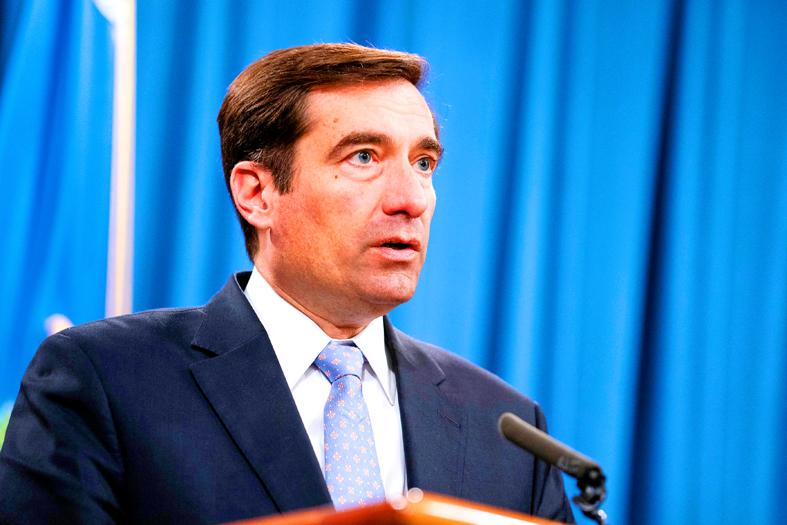The US on Wednesday restricted travel visas for members of the Chinese Communist Party (CCP), the latest blow to relations between the world’s biggest economies.
The new rules allow CCP members and their immediate families to obtain single-entry visas, which are to be limited to one month. Previously, CCP members could obtain multiple-entry visitor visas of as many as 10 years in duration.
“The CCP and its members actively work in the US to influence Americans through propaganda, economic coercion, and other nefarious activities,” a spokesperson at the US embassy in Beijing said in an e-mailed statement. “For decades we allowed the CCP free and unfettered access to US institutions and businesses while these same privileges were never extended freely to US citizens in China.”

Photo: Reuters
The CCP has about 92 million members, including national and local government leaders. Its ranks also include millions of businesspeople, such as Alibaba Group Holding Ltd (阿里巴巴) cofounder Jack Ma (馬雲), and members of the media and academia. It could also impact the children of CCP members, many of whom study in the US.
While Chinese Ministry of Foreign Affairs spokeswoman Hua Chunying (華春瑩) said that she was not aware of the new visa rules, she urged the US to reverse course.
“China lodges representations with the US side and we hope people in the US will adopt a common rational view toward China, and give up their hatred and abnormal mindset toward the CCP,” Hua told a regular news conference in Beijing yesterday.
In related news, more than 1,000 Chinese researchers have left the US amid a crackdown on alleged technology theft, top US security officials said on Wednesday, adding that Chinese agents had already been targeting members of the incoming administration of US president-elect Joe Biden.
US Assistant Attorney General for National Security John Demers told a discussion hosted by the Aspen Institute think tank that the researchers had left after the US Department of Justice launched multiple criminal cases against Chinese operatives for industrial and technological espionage.
A department official said that they were a different group to those mentioned by the US Department of State in September, when it said the US had revoked the visas of more than 1,000 Chinese nationals under a presidential measure denying entry to students and researchers deemed security risks.
The official said the researchers Demers referred to, who US authorities believed were affiliated with the People’s Liberation Army, fled the US after the FBI conducted interviews in more than 20 cities and the state department closed China’s Houston consulate in July.
“Only the Chinese have the resources and ability and will” to engage in the breadth of foreign influence activity that US agencies have seen, Demers said.
US National Counterintelligence and Security Center Director William Evanina told the same event that Chinese agents were already targeting personnel of the incoming Biden administration, as well as “people close” to the US president-elect’s team.

The Central Election Commission has amended election and recall regulations to require elected office candidates to provide proof that they have no Chinese citizenship, a Cabinet report said. The commission on Oct. 29 last year revised the Measures for the Permission of Family-based Residence, Long-term Residence and Settlement of People from the Mainland Area in the Taiwan Area (大陸地區人民在台灣地區依親居留長期居留或定居許可辦法), the Executive Yuan said in a report it submitted to the legislature for review. The revision requires Chinese citizens applying for permanent residency to submit notarial documents showing that they have lost their Chinese household record and have renounced — or have never

A magnitude 5.6 earthquake struck off the coast of Yilan County at 12:37pm today, with clear shaking felt across much of northern Taiwan. There were no immediate reports of damage. The epicenter of the quake was 16.9km east-southeast of Yilan County Hall offshore at a depth of 66.8km, Central Weather Administration (CWA) data showed. The maximum intensity registered at a 4 in Yilan County’s Nanao Township (南澳) on Taiwan’s seven-tier scale. Other parts of Yilan, as well as certain areas of Hualien County, Taipei, New Taipei City, Taoyuan, Hsinchu County, Taichung and Miaoli County, recorded intensities of 3. Residents of Yilan County and Taipei received

Taiwan has secured another breakthrough in fruit exports, with jujubes, dragon fruit and lychees approved for shipment to the EU, the Ministry of Agriculture said yesterday. The Animal and Plant Health Inspection Agency on Thursday received formal notification of the approval from the EU, the ministry said, adding that the decision was expected to expand Taiwanese fruit producers’ access to high-end European markets. Taiwan exported 126 tonnes of lychees last year, valued at US$1.48 million, with Japan accounting for 102 tonnes. Other export destinations included New Zealand, Hong Kong, the US and Australia, ministry data showed. Jujube exports totaled 103 tonnes, valued at

BIG SPENDERS: Foreign investors bought the most Taiwan equities since 2005, signaling confidence that an AI boom would continue to benefit chipmakers Taiwan Semiconductor Manufacturing Co’s (TSMC, 台積電) market capitalization swelled to US$2 trillion for the first time following a 4.25 percent rally in its American depositary receipts (ADR) overnight, putting the world’s biggest contract chipmaker sixth on the list of the world’s biggest companies by market capitalization, just behind Amazon.com Inc. The site CompaniesMarketcap.com ranked TSMC ahead of Saudi Aramco and Meta Platforms Inc. The Taiwanese company’s ADRs on Tuesday surged to US$385.75 on the New York Stock Exchange, as strong demand for artificial intelligence (AI) applications led to chip supply constraints and boost revenue growth to record-breaking levels. Each TSMC ADR represents